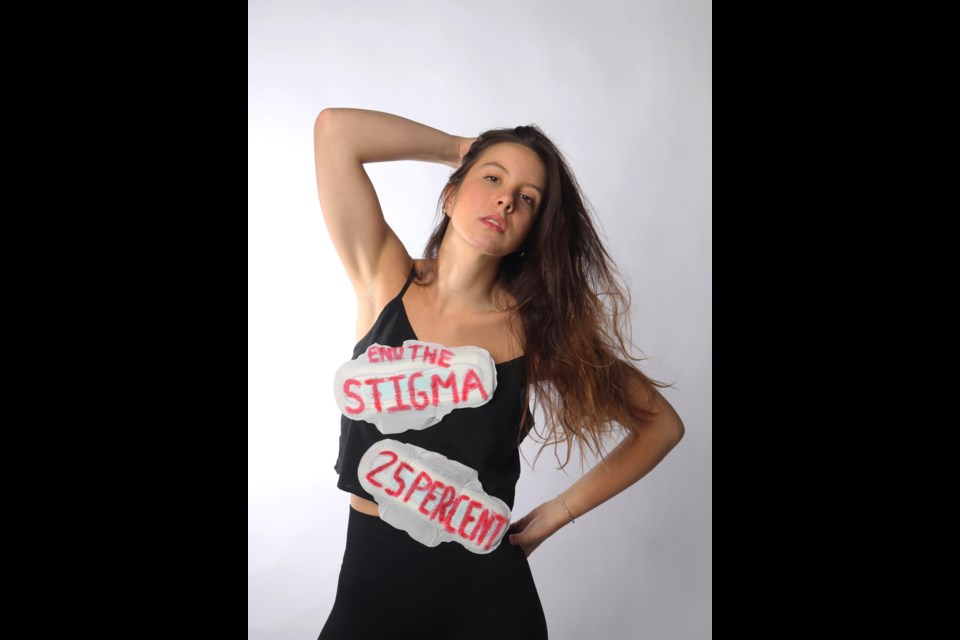Elinor Henderson believes that if people knew how expensive menstrual products were they would have a different appreciation for why her project to end period poverty is vital.
One in three women who menstruate cannot afford tampons, pads and liners, she says.
In some countries, women and girls miss school when they menstruate because they can’t afford menstrual products, according to Plan Canada.
For Henderson, providing period products to all people who menstruate — including transgender, and non-binary people — is a human right.
She says while talking about transgender and non-binary rights with her classmates, she came to the conclusion that the school did not provide period products in the gender-neutral washrooms.
“It’s not just cis-gendered women who menstruate,” says Henderson. “We need to change our mindset, because it’s not just people that are born female that menstruate.”
Without having these products in all the bathrooms, we’re leaving a large part of our community without access, explains the 17-year-old.
After her class presentation about period poverty set off conversations with her teacher Angie Marion and some of her classmates, Henderson knew she was onto something and her campaign called Let’s Change the Cycle took shape.
Within weeks, the campaign had raised more than $2,000 with generous donations coming from Grounded Coffee and No Borders Fitness. The local women’s gym raises funds and resources for the campaign through a Zumba class that accepts monetary and period product donations.
Henderson was excited to have the products and place them in all the bathrooms at Georgian Bay District Secondary School — the non-binary bathrooms and even the boys' bathrooms.
“Within about 10 minutes they were vandalized,” says Henderson, explaining that the products in the boys' bathrooms were stuffed into toilets, stuck to the walls, and covered in water in the sinks.
Henderson was crushed.
She used the experience as a teachable moment and doesn't mince words about how she feels towards the perpetrators.
“It opened my eyes to the demographic of people we’re dealing with,” says Henderson, “and how incredibly uneducated people are in our population.”
“It definitely came from transphobia as well,” says Henderson.
Henderson decided that she needed to educate youth, and her whole school about how difficult it is to go without products on your period.
With the help of her classmate, Aon-Miles Quesnelle, a trans man, Let’s Change the Cycle is undertaking an education campaign about sexual and reproductive health.
“This needs to be about more than products,” explains Henderson. “It needs to be an activist movement. We need to educate people about trans rights, and non-binary rights. People need more than an intro to sex-ed class. They need to talk about the issues.”
She and Quesnelle put together seminars, which are currently under review by the principal.
The seminars are available for any class and provide an overall lesson about period poverty, sexual and reproductive health, and trans and non-binary rights.
For instance, some trans may require access to period products after gender-affirming surgery. Trans women may require access to pads after vaginoplasty, and trans men may not choose to have bottom surgery, and therefore would still menstruate.
At the same time, trans are more likely to be unemployed, and therefore unable to afford period products.
According to the American Civil Liberties Union, “because limited access to and the cost of menstrual products can hit trans and non-binary communities especially hard, as a matter of policy, a holistic agenda for menstrual equity and access must include trans people.”
“Period poverty affects over 300 million people worldwide,” says Henderson who has plans to make the campaign into a non-profit.
Henderson will be meeting with a consultant in the next few weeks that helps people take movements and turn them into non-profits.
“It’s really grown,” says Henderson about the success of the campaign, which she launched a few weeks ago.
She would like to see it grow larger, because this issue is bigger than my high school.
Henderson says if you read this and find it inspiring, talk to your school about how you can bring period products into all the washrooms in your school.
Talk about the issue with your friends and family, says Henderson, who recognizes that talking about menstruation may be awkward.
“If you told me that I would be standing up in front of my whole school talking about periods when I was 13 I would have bawled,” says Henderson. “I’m trying to grow as a person. I’m young. I’m only 17.”
Removing the stigma and awkwardness from the discussion about a fact of life like periods that affects half the world’s population is precisely what will help end period poverty.
“Life’s too short not to advocate for something you believe in. Make changes,” she says.
“With our limited time on this Earth we need to make a difference.”
For more information about the movement visit their Instagram page Let’s Change the Cycle.
